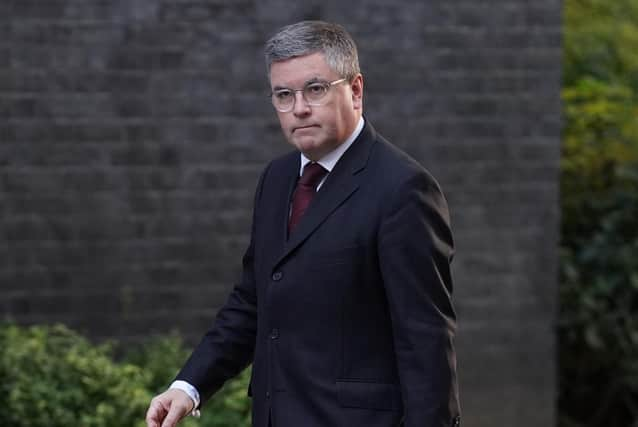NI Affairs chair under fire from DUP and Tory colleagues over remarks on the sovereignty of Northern Ireland


The DUP have described his comments on an Irish government role in Northern Ireland as “hollow threats” – but the Ulster Unionist leader Doug Beattie says the Secretary of State has already outlined to him an enhanced role for the Republic in the event Stormont doesn’t return.
Mr Buckland – chair of the Northern Ireland Affairs Committee – has also faced criticism for his remarks from Tory colleagues including former NI secretary Theresa Villiers.
Advertisement
Hide AdAdvertisement
Hide AdSpeaking on BBC News NI's The View programme on Thursday night, Sir Robert Buckland ruled out the previous form of direct rule from London – saying it would mean "triggering certain aspects of the Good Friday Agreement" and "involvement of the Irish government, ultimately".
Theresa Villiers MP – a former Secretary of State for Northern Ireland – has also rejected the idea.
She told the News Letter: “The three strand approach approach is a long-standing and important principle, backed by successive UK governments. It limits the role of the Irish Government and makes it clear that Northern Ireland’s domestic affairs are a matter for the UK only. I therefore don’t agree that the Irish Government should be involved in the governance of Northern Ireland, outside their established role in the north-south bodies established under the BGFA.”
Tory colleague David Jones MP, the deputy chair of the European Research Group, says its MPs would oppose such a move. The former Welsh Secretary told the News Letter: “Any involvement by the Irish government in the administration of Northern Ireland would be unacceptable to most, if not all, Conservative colleagues”.
Advertisement
Hide AdAdvertisement
Hide AdSir Robert also told the BBC that politicians should focus on bread and butter issues such as health and education “rather than constitutional issues that we all know are the province of either negotiators from the UK government – or indeed in the case of the Protocol – the EU”.
Baroness Kate Hoey said that while she appreciated that Sir Robert is new to his NIAC role – and she understands “he is keen to make a name for himself” – his comments are “shocking”.
The peer said: "I can’t believe that he is suggesting that the constitutional position of Northern Ireland is only alterable by the European Union. This goes even further than the EU having a say over our trading arrangements and it’s quite shocking that a chair of a NI select committee should be so much in hock to the EU”.
Former MEP Ben Habib – an anti-protocol campaigner – said Mr Buckland’s comments on the EU’s role were “utterly idiotic”.
Advertisement
Hide AdAdvertisement
Hide AdThe Reform Party candidate said: “Constitutional matters are most certainly NOT for the EU, they are the sole preserve of Parliament. That Buckland would hand over the guardianship of our constitution to a foreign power confirms he is utterly unfit for office”.
Theresa Villiers – who signed Mr Buckland’s nomination papers for the NIAC role – said: “The Windsor Framework continues to have a big impact. It is therefore inevitable that NI’s politicians will want a say on the future of the framework. That doesn’t mean neglecting other domestic issues. It seems to me that NI’s leaders are rightly focused on both public services and seeking to remedy problems with EU trading arrangements.”
However, Alliance deputy leader Stephen Farry said there has been an Irish dimension here since the Anglo-Irish Agreement but any potential involvement of the Irish Government now would not be joint authority.
The North Down MP said: “It would instead be in a consultative nature, with no direct decision-making function. However, other options remain on the table, with Alliance advocating reform of the institutions to allow those who wish to get on with their jobs to do so. It is not simply just a binary choice of restoration under the current structures or direct rule”.
Advertisement
Hide AdAdvertisement
Hide AdThe Northern Ireland Office responded saying “joint authority is not being considered. The structures governing the role of the Irish Government in Northern Ireland affairs are set out in the Belfast (Good Friday) Agreement. The UK Government remains committed to upholding the Agreement in all its dimensions”.
Comment Guidelines
National World encourages reader discussion on our stories. User feedback, insights and back-and-forth exchanges add a rich layer of context to reporting. Please review our Community Guidelines before commenting.